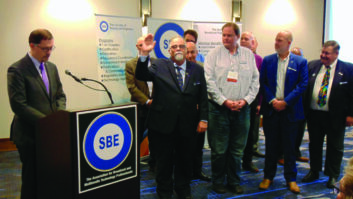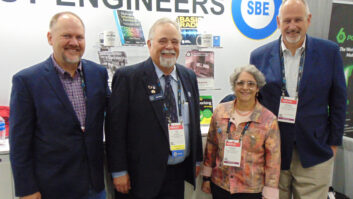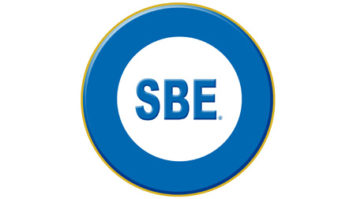The annual Technology Luncheon at NAB2003 honored contributions by two veterans of the Federal Communications Commission, and gave attendees some food for thought.
FCC veteran John Reiser received the NAB Engineering Award for Radio. He spoke with respect of the many engineering professionals with whom he has worked, regaling his audience with examples of “the inventiveness and endurance to keep signals radiating.” He marveled at the collective skill and know-how developed by radio engineersand said those skills help keep the system going.
He paid tribute to engineering legends and consultants, including Radio World contributors John Bisset and Harold Hallikainen, and said that in his “sincerest humble opinion, (engineers) are the broadcast industry’s real talent.”
Reiser, who retired in 2000 as a senior broadcast engineer with the FCC’s International Bureau, was with the commission for 39 years. He was involved in the standardization of the FCC program for broadcast station inspections in the 1970s, a notable revision of the broadcast rules and regulations and the reorganization of the Broadcast Bureau into what is now the Media Bureau.
He was U.S. chairman of technical study groups on broadcasting that participate in the standards and conference preparatory work of the International Telecommunications Union; and he represented the United States at numerous international broadcast meetings.
The NAB’s Engineering Award for Television was given to Robert P. Eckert, instrumental in the FCC’s assignment of digital television channel assignments.
Also at the luncheon, futurist George Gilder gave a talk called “From Telecosm to Telechasm.” He examined communications models and asserted that industry is well past the Television Age and now even the Age of Computers.
Gilder said the TV Age was characterized by a “top-down solution for a peer-to-peer world.” He suggested that the Computer Age was characterized by a scarcity of bandwidth. His description of the state of streaming video: “a dribble-cast.”
Gilder says society now is deep into a Communications Era, characterized by ample information but a scarcity of time.
Gilder suggested that optical networks will become the systems of the future as robust fiber-optic networks become more prevalent. He discussed the concept of “span of life” and proposed changes to widely used advertising models. He said advertisers who are considerate of the customer’s time and craft ads that contribute value will win the hearts and minds of customers. The consumer “won’t watch ads he doesn’t want to see.”
In his model, power devolves to the customer, rather than the organization, which currently treats the customer as an externality and does not take into account the value of that customer’s time.
Gilder suggested that “content and conduit have to separate,” invoking the examples of AOL and other media companies in trouble. “Profits will migrate (to those who provide) the missing element in the system,” he said.






